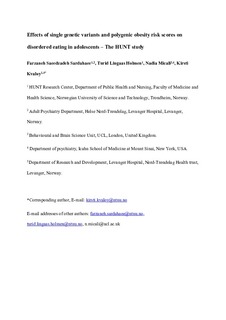| dc.contributor.author | S Sardahaee, Farzaneh | |
| dc.contributor.author | Holmen, Turid Lingaas | |
| dc.contributor.author | Micali, Nadia | |
| dc.contributor.author | Kvaløy, Kirsti | |
| dc.date.accessioned | 2019-03-08T09:20:38Z | |
| dc.date.available | 2019-03-08T09:20:38Z | |
| dc.date.created | 2017-09-07T12:57:01Z | |
| dc.date.issued | 2017 | |
| dc.identifier.citation | Appetite. 2017, 118 8-16. | nb_NO |
| dc.identifier.issn | 0195-6663 | |
| dc.identifier.uri | http://hdl.handle.net/11250/2589300 | |
| dc.description.abstract | Purpose
Improving the understanding of the role of genetic risk on disordered eating (DE).
Methods
A case-control study including 1757 (F: 979, M: 778) adolescents (aged 13–19 years) from the Nord-Trøndelag Health Study (HUNT), an ethnically homogenous Norwegian population based study. Cases and controls were defined using a shortened version of the Eating Attitude Test. Logistic regression was employed to test for associations between DE phenotypes and 24 obesity and eating disorder susceptibility SNPs, and the joint effect of a subset of these in a genetic risk score (GRS).
Results
COMT was shown to be associated with poor appetite/undereating (OR: 0.6, CI 95%: 0.43–0.83, p = 0.002). Independent of obesity associations, the weighted GRS was associated to overeating in 13–15 year old females (OR: 2.07, CI 95%: 1.14–3.76, p = 0.017). Additionally, a significant association was observed between the GRS and loss of control over eating in the total sample (OR: 1.62, CI 95%: 1.01–2.61, p = 0.046).
Conclusions
The COMT variant (rs4680) was associated with poor appetite/undereating. Our study further confirms prior findings that obesity risk also confers risk for loss of control over eating; and overeating amongst girls. | nb_NO |
| dc.language.iso | eng | nb_NO |
| dc.publisher | Elsevier | nb_NO |
| dc.rights | Attribution-NonCommercial-NoDerivatives 4.0 Internasjonal | * |
| dc.rights.uri | http://creativecommons.org/licenses/by-nc-nd/4.0/deed.no | * |
| dc.title | Effects of single genetic variants and polygenic obesity risk scores on disordered eating in adolescents - The HUNT study | nb_NO |
| dc.title.alternative | Effects of single genetic variants and polygenic obesity risk scores on disordered eating in adolescentseThe HUNT study | nb_NO |
| dc.type | Journal article | nb_NO |
| dc.type | Peer reviewed | nb_NO |
| dc.description.version | acceptedVersion | nb_NO |
| dc.source.pagenumber | 8-16 | nb_NO |
| dc.source.volume | 118 | nb_NO |
| dc.source.journal | Appetite | nb_NO |
| dc.identifier.doi | 10.1016/j.appet.2017.07.003 | |
| dc.identifier.cristin | 1491712 | |
| dc.description.localcode | © 2018. This is the authors’ accepted and refereed manuscript to the article. Locked until 8.7.2019 due to copyright restrictions. This manuscript version is made available under the CC-BY-NC-ND 4.0 license http://creativecommons.org/licenses/by-nc-nd/4.0/ | nb_NO |
| cristin.unitcode | 194,65,20,15 | |
| cristin.unitcode | 194,65,20,0 | |
| cristin.unitname | Helseundersøkelsen i Nord-Trøndelag | |
| cristin.unitname | Institutt for samfunnsmedisin og sykepleie | |
| cristin.ispublished | true | |
| cristin.fulltext | original | |
| cristin.qualitycode | 1 | |

